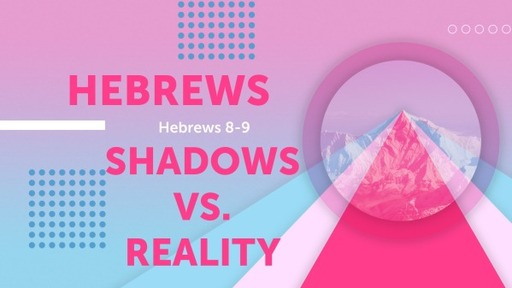Shadows Vs Realities

Notes
Transcript
Change is hard.
Change is hard.
Even for those like me, who typically like change, it is hard to pull off.
Negative consequences rarely motivates change.
Negative consequences rarely motivates change.
This seems counter-intuitive but research has shown this to be true. Alan Deutschman in his book titled, Change or Die, reveals this is not the case. Most of our medical issues in this country are from preventable diseases. Yet, for a doctor to tell someone “if you don’t lose 40 pounds you will die,” it rarely produces change.
Hebrews motivates by showing the benefits.
Hebrews motivates by showing the benefits.
The speaker of Hebrews does not just lay out a bunch of consequences of what may happen. Instead he is painting a picture of what can be true reality. Because of the better covenant, the better High Priest, the better Salvation life can be different! The pains, persecution, and heartaches are worth it because Jesus is better than the old way.
Earth is a shadow of heaven.
Earth is a shadow of heaven.
In Hebrews 8 and 9 we see a long description of the worship of the Old Testament. Something most of us find boring and just eager to pass on. Just like we have the light of the moon only because of the sun. Heaven is what reality is supposed to be. Earth is a copy, sometimes a very poor copy, of those realities.
God desires a relationship.
God desires a relationship.
This is the promise of Scripture. From the very beginning there was a relationship with God. Part of the imagery of the wilderness journey is the tabernacle, would be in the middle of the nation. Signifying the relationship of God and the Israelites.
God defines the relationship.
God defines the relationship.
We don’t just approach God however we want. God is holy and as such defines the relationship in that manner. Part of the beauty, yes it is beautiful, of the OT covenant is how simple, methodical, and freeing the system God set up was. Yet, it was only one day a year the High Priest would go into the Holy of Holies.
Sin leaves a stain.
Sin leaves a stain.
Why did the Holy of Holies need to be purified once a year? No one, and I mean no one, was allowed in it except for the one day of year. The effects and result of sin stains everything. Not just what we touch.
Forgiveness requires sacrifice.
Forgiveness requires sacrifice.
The whole sacrificial system is foreign to us. In fact, in our modern day era, some see the killing of animals for forgiveness as barbaric. We easily move on to trying to get “rid” of references to shedding of blood. Easy for us to look back and see something as “barbaric” when we have created new and more powerful ways of killing, torturing, and de-humanizing others. We have nuclear weapons, even used it on others, we have abortion and euthanasia, systematic genocide of others just because of race or beliefs, and the list could go on.
Yet, the beauty of requiring a sacrifice is the fact everyone was treated the same. As we see in these chapters the high priest did not just provide the sacrifice of the scapegoat but also a bull for himself. There was no room for spiritual pride when it came to the temple worship. The beauty is the nation of Israel realized the effects of sin and the holiness of God.
God always has a plan.
God always has a plan.
His plan was not the be culminated in the OT system of approaching him. There was a “better” way coming forth. This is why the prophet Jeremiah spoke the words he did, which our writer quotes in this chapter.
Christ is the final sacrifice.
Christ is the final sacrifice.
He did/does what no animal sacrifice could do, go straight to the face of God. He offered himself as a complete sacrifice to fulfill what the old covenant embodied. He came once to bear the sin of the world, once and for all. This is why there is never going to be anything better. Some cults and religions claim they are the better version of life, or the real deal. That most other churches are just shadows and poor copies but they are the true church and/or religion. In making this claim they de-value and minimize who Jesus is and His work. Always leading to their own demise.
What is our response?
We are to approach God through Jesus.
We are to approach God through Jesus.
God wants a relationship. He wants us.
Because of God’s grace, we serve him.
Because of God’s grace, we serve him.
The grace of forgiveness leads us not to a spiritual pride but to a state of servanthood.
We are open to transformation.
We are open to transformation.
I don’t know what the Lord wants to do but I know this much, it was transformation of lives. This starts from the inside out. He doesn’t want us to just dress up our mess but to take our mess and exchange it for his clothing.
Because of his holiness he will bring us wholeness through transformation.
We bring heaven to earth.
We bring heaven to earth.
